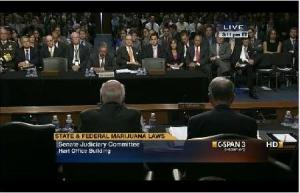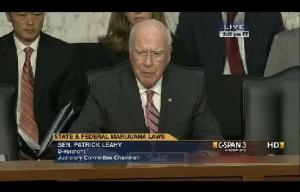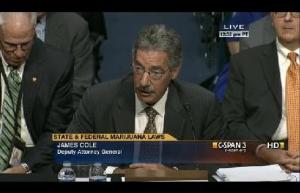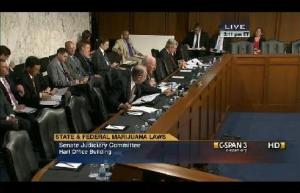The times they are a-changing, if Tuesdays Senate Judiciary Committee hearing on marijuana policy is any indication. Only one senator suffered from Reefer Madness; the others wanted to figure out how to make things work.
Colorado is first out of the gate with final rules for legal marijuana commerce, with the first shops expected to open around New Year's Day, but Washington state isn't far behind.
Now more than ever, StoptheDrugWar.org needs your financial support to continue to provide this crucial informational tool that builds and empowers the movement. We have a special new offer for those donating $50 or more, which this post provides some updated information about.
A bill that would turn felony drug possession cases into "wobblers," meaning they could be charged as either felonies or misdemeanors, is one housekeeping vote away from heading to the governor's desk.
Private plane pilots across the country are reporting that they are being subjected to warrantless drug searches by Customs and local police, even when they haven't left the country. And especially if they've been flying in marijuana-friendly states.
Buds on the bayou? Louisiana voters support marijuana legalization, according to a new poll.
Arizona US Senator John McCain said Thursday night he was open to legalizing marijuana. It is "the will of the people," he said.
Comments in the Senate Judiciary Committee provided hope that medical marijuana's banking problems may be ending, California communities continue to tussle over the issue, and a New Jersey bill is signed into law. There's more, too.
A clamor is growing for congressional hearings on the DEA. Recent revelations of the DEA's use of NSA and AT&T spy data provided the catalyst, but concern has been festering for years.
An unarmed alleged meth dealer was gunned down by undercover California cops in a restaurant parking lot after they said he threatened them. The dead man's family would like some answers. Good luck with that.
A Texas trooper who shot and killed two Guatemalan immigrants from a helicopter as he pursued what he thought was a drug load has been cleared of any criminal misdoing. But at least Texas authorities have had to revise their policy on the use of deadly force from the air.
The year's 28th drug war killing occurred Monday night during a drug raid in Harbor Hills, Texas.
More jail guards in trouble, and a Georgia cop gets nailed for helping meth dealers.
An annual student competition is taking on drug policy this year. The first of two papers for students entering is due October 30th.
Interns are making an important difference fighting the good fight with us at StoptheDrugWar.org.
The Senate Judiciary Committee Tuesday afternoon held a hearing on marijuana legalization and conflicts between state and federal marijuana laws. Led by committee Chairman Sen. Patrick Leahy (D-VT), the hearing featured testimony from the deputy attorney general who has set Justice Department policy, two officials in states that have legalized marijuana and one critic of marijuana legalization.
The hearing marked the first time Congress has grappled with the issue of responding to state-level marijuana legalization and was notable for its emphasis on making legalization work in states where it is legal. It was also notable in that of all the senators present, only one, Sen. Charles
Grassley (R-IA), bothered to dredge up the sort of anti-marijuana rhetoric that had in years and decades past been so typical on Capitol Hill.
"Marijuana is a dangerous and addictive drug," said Grassley, who turns 80 next week. "It's illegal under international law as well, and the treaty requires us to restrict its use to scientific and medical uses. These [legalization] laws flatly contradict our federal law. Some experts fear a Big Marijuana, a Starbucks of marijuana," he lamented.
Grassley's lonely stand reflects changing political realities around marijuana policy. The other senators who spoke up during the hearing -- Democrats Leahy, Richard Blumenthal of Connecticut, and Sheldon Whitehouse of Rhode Island -- all represent states where voters have already expressed support for medical marijuana and a region where support for outright legalization is high. They were all more interested in removing obstacles to a workable legalization than in turning back the clock.
"Last November, the people of Colorado and Washington voted to legalize marijuana, and these new laws are just the latest example of the growing tension between state and federal marijuana laws and the uncertainty about how such conflicts are resolved," Leahy said as he opened the hearing. "Marijuana use in this country is nothing new, but the way in which individual states deal with it continues to evolve. We all agree on the necessity of preventing distribution to minors, on preventing criminal enterprises from profiting, and on drugged driving. But I hope that there might also be agreement that we can't be satisfied with the status quo."
The first witness was Deputy Attorney General James Cole, author of last month's policy directive notifying state governments that the Justice Department would not seek to preempt their marijuana laws and instructing all federal prosecutors to leave legal marijuana alone -- with a number of exceptions. Sales to minors, the use of guns or violence, profiting by criminal groups, a marked increase in public health consequences like drugged driving, and distribution of marijuana into non-legal states are all among the factors that could excite a federal response, Cole's directive noted.
On Tuesday, Cole reiterated and went over the policy directive for senators, but the most striking part of his testimony was his admission that the federal government could not effectively put the genie back in the bottle.
"It would be very challenging to preempt decriminalization," Cole conceded in response to a question from Leahy. "We might have an easier time preempting the regulatory scheme, but then what do you have? Legal marijuana and no enforcement mechanism, which is probably not a good situation. You would also have money going to organized criminal enterprises instead of state coffers."
The three Democratic senators all prodded Cole and the Justice Department to do something about the legal marijuana (and medical marijuana) industry's problems with banks and financial services. Because of federal pressure, such institutions have refused to deal with marijuana, leaving those businesses drowning in cash. The senators also questioned reports that the DEA had been telling armored car companies not to do business with marijuana businesses.
"What about the banking industry?" asked Leahy. "A cash only business is a prescription for problems. We're hearing that DEA agents are instructing armored car companies to stop providing services to medical marijuana companies. It's almost as if they're saying 'let's see if we can have some robberies.' What is the department going to do to address those concerns?"
"The governors of Colorado and Washington raised this same issue," Cole acknowledged. "There is a public safety concern when businesses have a lot of cash sitting around; there are guns associated with that. We're talking with FinCEN and bank regulators to find ways to deal with this in accordance with laws on the books today."
"There should be specific guidance to the financial services industry," a not-quite-mollified Leahy replied.
The committee then heard from King County (Seattle), Washington, Sheriff John Urquhart. "The war on drugs has been a failure," the sheriff said bluntly. "We have not reduced demand, but instead incarcerated a generation of individuals. The citizens decided to try something new. We, the government, failed the people, and they decided to try something new."
Urquhart saw no great tension between the federal government and legal marijuana states, and he, too, brought up the issue of banking services.
"The reality is we do have complementary goals and values," Urquhart said. "We all agree we don't want our children using marijuana. We all agree we don't want impaired drivers. We all agree we don't want to continue enriching criminals. I am simply asking that the federal government allow banks to work with legitimate marijuana businesses who are licensed under this new state law."
The committee also heard from Kevin Sabet of Project SAM (Smart About Marijuana), the voice of 21st Century neo-prohibitionism.
"In states like Colorado," he said, "we've seen medical marijuana cards handed out like candy, we've seen mass advertising. At the marijuana festival in Seattle we saw 50,000 people smoking marijuana publicly; it's the public use of marijuana that worries me. I don't see the evidence of trying to implement something robust, especially in the face of an industry that will be pushing back against every single provision. In a country with a First Amendment and alcohol and tobacco industries that profit off addiction, I worry that, inevitably, American-style legalization is commercialization, no matter the interests of state officials and regulators."
But nobody except
Grassley seemed to be listening.
Marijuana legalization advocates and drug law reformers liked what they heard Tuesday.
"It feels like there's a paradigm shift underway in the Justice Department's interpretation of federal drug control law," said Ethan Nadelmann, executive director of the Drug Policy Alliance. "They seem to recognize that drug control should be first and foremost about protecting public health and safety, and that smart statewide regulatory systems of the sort that Colorado and Washington are proposing may advance those objectives better than knee-jerk enforcement of federal prohibitions."
"For years, the legalization movement has been gaining traction as people learn this is neither a fringe issue nor a partisan one, but one responsible for deep inequities in our justice system, the expansion of criminal gangs and the increase in unsolved violent crimes," said Law Enforcement Against Prohibition (LEAP) board member and former Denver cop Tony Ryan. "There's a long road ahead, and this hearing leaves many questions unanswered, but this historic discussion means we are on our way to a more rational and effective drug policy."
"The Department of Justice is finally taking seriously the dangers that a lack of access to simple banking services poses to consumers, employees and business owners," said Aaron Smith, director of the National Cannabis Industry Association. "We are encouraged that the growing consensus among essentially all stakeholders is that banking access must be available to legal businesses. It portends a quick reform to this dangerous and unnecessary situation."
"The era of robust state-based regulation is here," said Bill Piper, director of national affairs for the Drug Policy Alliance. "Legalizing marijuana and shrinking the number of people behind bars in the US is an issue the left and right can join together on. Like the repeal of alcohol prohibition, the repeal of marijuana prohibition will save taxpayer money, put organized crime syndicates out of business, and protect the safety of young people."
But at a time when marijuana prohibition remains the federal law of the land, perhaps former Seattle police chief and LEAP member Norm Stamper had the most down-to-earth take.
"While I would have liked to have seen a substantive change in policy, what we were really listening to in that hearing was the sound of a changing political climate," said Stamper. "People who can't agree on any other political issue are coming together over this one, and politicians on both sides of the aisle ignore that at their own peril."
back to top
Colorado this week became the first legal marijuana state to set its final rules for pot commerce, but Washington state isn't far behind. Voters in the two states last November approved marijuana legalization, and the actuality of it now looms.
On Monday, the Colorado Department of Revenue released 136 pages of final rules designed to provide clear guidance for marijuana entrepreneurs and police alike. The rules require pot businesses to track inventory from seed to sale, as well as setting numerous conditions and restrictions on everything from packaging to advertising to hours of operation.
Now that the rules process is finalized, applications and licensing can get under way. The first marijuana retail establishments are expected to open around New Year's Day.
Meanwhile, the Washington State Liquor and Cannabis Board, which is charged with implementing legalization in the Evergreen State, last week issued its latest revised proposed rules. They aren't the last word. The Board will hold several public hearings in the coming weeks, but is on track to finalize the rules and begin issuing licenses for marijuana businesses around the same time those first pot shops are opening in Colorado.
The Washington marijuana commerce rules now contemplate 334 marijuana retail stores operating in the state and cap production at 87,500 pounds per year based on estimated demand. The Board estimates that legally produced marijuana could be available for sale by June.
back to top
Dear friend of drug policy reform,
StoptheDrugWar.org needs your support more than ever before to continue our work of getting the word out online for the drug policy reform movement, building the movement, and providing this crucial informational tool that reformers around the world use in their work every day. I ask your support at this time with the most generous donation you can afford to enable this newsletter to continue.
In recent weeks we've announced our latest offer for members donating $50 or more, author-signed copies of three important new books. Phil has now completed reviews of all three of these works, most recently NYT bestselling author Doug Fine's -- Too High to Fail: Cannabis and the New Green Economic Revolution, as well as Marc Mauer and Sabrina Jones's Race to Incarcerate: A Graphic Retelling and Carl Hart's High Price: A Neuroscientist's Journey of Self-Discovery That Challenges Everything You Know About Drugs and Society.
To donate, and to order any of these or other items we offer, please use our online donation form at http://stopthedrugwar.org/donate, or scroll down for info on donating by mail. We are asking donations of $50 or more for a signed copy of any one or these books, $95 or more for signed copies of any two, or $135 or more for signed copies of all three. (If more than 25 people order the books by the time you place your order, we will ask the authors if they're willing to sign more. If that can't be worked out, we'll contact you and offer to make different arrangements, whether for a full or partial refund or to send different items.)
Now, $50 is a little more than we've asked for such items in the past, and of course they can be ordered online or purchased in a bookstore for less. Things have changed in the drug reform funding scene, making our organization more dependent on membership to continue our programs -- I hope you'll choose to support us at this time. Note that we continue to offer a range of books, videos, and StoptheDrugWar.org gift items with donations of as little as $7 -- visit our donation form to see the full list.
Also note that donations to StoptheDrugWar.org can be tax-deductible, supporting our educational work, or non-deductible, supporting our lobbying work. (Note that selecting any gift items reduces the amount of your donation that is deductible -- which with a smaller gift amount can be most of it.) Donations can be made by credit card or PayPal at http://stopthedrugwar.org/donate, or sent by mail to P.O. Box 18402, Washington, DC 20036. If you are donating by check, please make it payable to DRCNet Foundation (if tax-deductible) or Drug Reform Coordination Network (if not deductible). If you wish to donate stock, the information to give your brokerage is Ameritrade, (800) 669-3900), DTC#0188, and account number 781926492 for tax-deductible gifts or 864663500 for non-deductible gifts -- please make sure to contact us if donating in this way.
Thank you for standing with us to stop the drug war's cruelties and meet the opportunity this time offers to make a brighter future. As recent events show, time and the truth are on our side!
Sincerely,

David Borden, Executive Director
StoptheDrugWar.org
Washington, DC
http://stopthedrugwar.org
back to top
A bill that would allow some drug possession cases to be charged as misdemeanors instead of felonies passed the state Assembly Wednesday. The bill has already passed the Senate, but most go back there for a final concurrence vote before heading to the desk of Gov. Jerry Brown (D).

California prison overcrowding (US Supreme Court)
, filed by Sen. Mark Leno (D-San Francisco) would give local judges and prosecutors discretion on charging simple possession cases as felonies or misdemeanors. California sees about 10,000 drug possession cases each year. That figure does not include marijuana, which was decriminalized under
Gov. Arnold Schwarzenegger (R).
Passage of the bill would help reduce prison and jail overcrowding in California and potentially even provide savings to the financially-strapped courts because felony charges require setting a preliminary hearing, whereas misdemeanor offenses do not.
"We know we can reduce crime by offering low-level offenders rehabilitation and the opportunity to successfully reenter their communities, but we are currently doing the opposite," Leno said after the Assembly vote. "We give nonviolent drug offenders long terms, offer them no treatment while they're incarcerated, and then release them back into the community with few job prospects or options to receive an education. SB 649 gives local governments the flexibility to choose reduced penalties so that they can reinvest in proven alternatives that benefit minor offenders and reserve limited jail space for serious criminals."
"Our system is broken," said Lynne Lyman, California state director for the Drug Policy Alliance, one of the bill sponsors. "Felony sentences don't reduce drug use and don't persuade users to seek treatment, but instead, impose tremendous barriers to housing, education and employment after release -- three things we know help keep people out of our criminal justice system and successfully reintegrate into their families and communities."
Leno's bill comes as California struggles to comply with a federal mandate to reduce prison overcrowding. Gov. Brown and Assembly Democrats have concocted a plan to use a private prison facility staffed with unionized state prison guards, but that plan is running into opposition among Democrats in the Senate, who are seeking instead to increase funding to counties that have incurred higher costs because of Brown's incarceration realignment plan, which shifts some prison inmates to county jails.
Even after realignment, there are still more than 4,100 people serving California prison time for simple drug possession. State taxpayers are paying $207 million a year to keep them there.
"Based on my 38 years in the criminal justice system, including five years presiding over an adult drug court, I've seen firsthand how fundamentally unjust it is for simple possession offenses to be charged as straight felonies when many more serious and harmful offenses are prosecuted as misdemeanors," said the Hon. Harlan Grossman, a retired Superior Court Judge from Contra Costa County. "It's time to rethink how low-level drug offenses are prosecuted in California. As a judge, I can tell you that there is nothing fair or just about a punishment that does not fit the crime."
If Gov. Brown signs the bill into law, California will be on the same path as 13 other states, the District of Columbia, and the federal government as jurisdictions that treat drug possession as a misdemeanor. Those states do not demonstrate higher levels of drug use or drug crime than states that have not defelonized drug possession.
back to top
Private plane pilots, especially those traveling to or through states with relaxed marijuana laws, are being subjected to warrantless searches by state and federal law enforcement, the Toledo Blade reported Monday.

Warrants? They don't need no steenking warrants. (cbp.gov)
The newspaper reported that the Aircraft Owners and Pilots Association, which represents small plane owners and operators across the country, said it had received dozens of complaints from members "subjected to random searches" by Customs officers, local police, or both.
"None of the stops resulted in anything being found," said Steve Hedges, a spokesman for the owners and pilots association. "In most cases, the pilots were stopped and held while their planes were searched… I'm told one pilot was asleep in a motel room with his wife when agents kicked the door down and took them back out to the airport to search his plane, only to find nothing there."
Hedges said the pilots' group has filed Freedom of Information Act requests for documentation justifying the searches, but didn't expect to get a response for months.
The Blade also cited a June blog entry by the editor of Flying magazine, Robert Goyer, where Goyer described email and phone conversations with an unnamed "law enforcement source… who is knowledgeable about aviation matters" who described his 2009 training to participate in a federal drug interdiction program targeting private pilots. That source said he was taught pilots were to be treated as though they had no right to refuse a search.
"What they taught law enforcement officers and agents was that all aircraft can be detained since they fall under the… authority of the FAA [Federal Aviation Administration]," Goyer quoted the source. "This, in effect, gives them complete search authority of any aircraft."
Goyer described the training as an "aviation drug interdiction" class sponsored by a High Intensity Drug Trafficking Area (HIDTA) office. The training was conducted by two agents, one from Homeland Security and one from Customs and Border Patrol, the source said.
As part of the program, "suspicious" planes would be tracked and followed by a Homeland Security aircraft, and once the plane landed, the pilots would be approached often at gunpoint and usually by local law enforcement and detained until federal agents arrive on the scene. Then they are ramp checked for compliance with Federal Aviation Authority (FAA) regulations and the planes searched.
"Our source told us that the ramp check was just a ploy to search the airplane and that the real target of the search was drugs, though even that, he said, could be used as a pretense for apprehending other potential criminals," Goyer noted.
The federal agents teaching the class he attended did not specify what other kind of "target" they might find, the source said, adding that instructors warned that the success rate for such searches was likely to be low, but that they could yield a "big bite" when successful.
A Customs official told the Blade that its job included "ensuring that all persons and cargo enter the US legally and safely through official ports of entry, preventing the illegal entry into the US of persons and contraband at and between POEs [points of entry], ensuring the safe and efficient flow of commerce into the United States, and enforcing trade and tariff laws and regulations," but did not explain how stopping and searching planes that had not left the US fit with that mission.
The Blade also cited a letter from acting Customs and Border Protection commissioner Thomas Winkowski saying that the agency has the authority "to inspect a pilot's operating certificate and related aircraft documents" on the basis of federal code governing the licensing of pilots and registration of aircraft."
"In the course of conducting a pilot certificate inspection, facts may arise meriting further investigation or search to the extent authorized under the Constitution and consistent with federal law," Winkowski wrote. "Each interaction and event must be evaluated independently based on the facts present at the time of the encounter." Such searches could include a "limited search" of the pilot if there is "reasonable suspicion" the person is armed and dangerous; a "protective sweep based on reasonable suspicion that a person is hidden who intends to impede or harm the law enforcement officer," or a search of the vehicle "based on probable cause that contraband or evidence is onboard the aircraft."
But the plane owners and pilots' association said that all 42 of the pilots who have reported such searches denied there was any probable cause or reasonable suspicion to search their planes. None had crossed a US border during its flight.
One pilot cited by the Blade said he had flown a plane from Concord, California, to Boonville, Missouri -- both within the United States -- and when he landed to refuel in Pueblo, Colorado, four unmarked vehicles surrounded his plane. Local police told him they had received a call from the Border Patrol saying he was "under suspicion of transporting large amounts of marijuana."
The only thing that could have remotely suggested the flight might be involved with drugs, the pilot said, was that it originated in California. "They think people are flying pot out of California," Mr. Brodsky said. "They're casting a wide net and hoping to catch something -- and trampling people's civil rights in the process."
Another pilot, who had twice been searched at airports, said police in both encounters mentioned they thought the plane "had been involved in drug trafficking." It wasn't, and the pilot said he was tired of it. He said he would "comply, be courteous" with police requests, but would not consent to any searches.
"At that point, I'll get legal counsel if they do," he said."I don't think there's any reason why a US citizen should be searched, or asked to search, unless they law enforcement have a warrant or probable cause," he said.
"When they got all this Homeland Security money, well, there are only so many terrorists out there to fight," the first pilot said, so it was predictable that it "would be turned on our own citizens."
back to top
A poll released Thursday by the American Civil Liberties Union of Louisiana found a slim majority favoring marijuana legalization. The Public Policy Polling survey had support for taxed and regulated marijuana legalization at 53% and support for medical marijuana at 65%.
The poll also found little support for the state's current harsh marijuana laws, some of the most
draconian in the nation. Under current Louisiana law, someone convicted of a marijuana offense can be sentenced to life without parole if he has a prior felony and prison terms can be up to 20 years for repeat marijuana possession offenders.
But only 22% of respondents favored life without parole for felons busted for pot, and only 32% favored the long prison sentences for simple possession, even for repeat offenders. Yet oddly enough, only 47% supported making a six month jail sentence and a fine the maximum sentence for repeat possession offenders.
"People understand that criminalizing marijuana has wasted public funds, has not made anyone safer, and that marijuana is not the danger it was thought to be," said Marjorie Esman, executive director of the ACLU of Louisiana. "Despite last session's failure to pass a bill to reform marijuana sentencing (House Bill 103), marijuana law reform is coming to Louisiana. Voters in this state are in agreement with the rest of America that marijuana should be taxed and regulated," Esman said.
HB 103 would have reduced sentences for simple marijuana possession from 20 years in prison to two years for a third offense conviction, and no more than five years for a subsequent offense. It was watered down in the House before going to the Senate, where it was killed.
"This new poll also shows that a majority of Louisiana voters think it's time to change the state's outdated and overly harsh marijuana sentencing laws," said Esman. "The ACLU stands with the 59% of Louisianans who oppose long prison sentences, and 64% who oppose a sentence of life without parole for a marijuana offense."
back to top
At a town hall meeting in Tucson Thursday, Sen. John McCain (R) signaled that he could be receptive to legalizing marijuana. His comments came just a week after the Obama administration said it would not interfere with taxed and regulated marijuana distribution in Colorado and Washington, whose voters legalized it last November.
"Maybe we should legalize," McCain said, according to
a tweet from Arizona Star columnist Tim Steller. "We're certainly moving that way as far as marijuana is concerned. I respect the will of the people."
The will of the people in Arizona certainly appears to be in favor of marijuana law reform. A May Behavior Research Center poll found that 56% favored legalization "of small amounts for personal use," with only 37% opposed. While strong majorities of independents (72%) and Democrats (61%) favored decriminalization, so did a sizeable minority (41%) of McCain's fellow Republicans.
That same poll also showed majority support for gay marriage, leading the Behavior Research Center to comment on the vagaries of shifting public opinion.
"It is perhaps ironic that as support for same-sex marriage and defelonization of marijuana have long been albatrosses which conservative candidates could hang around the necks of some of their moderate or liberal challengers, it now appears that hard opposition to gay marriage and perhaps even to marijuana liberalization could become issues moderates and liberals can use against their conservative opponents," the polling firm said.
And plans are afoot to put the issue before voters next year. Activists organized as Safer Arizona in June filed a constitutional amendment initiative with the secretary of state's office. Signature-gathering is underway, and organizers must come up with 259,213 valid voter signatures by July 3, 2014 to qualify for the November 2014 ballot.
A smart politician who wants to get reelected listens to the will of the people. Whatever one thinks of John McCain's views on various issues, the senator is no dummy.
back to top
Comments in the Senate Judiciary Committee provided hope that medical marijuana's banking problems may be ending, California communities continue to tussle over the issue, and a New Jersey bill is signed into law. There's more, too. Let's get to it:
NationalOn Tuesday, a hint came that banking issues for dispensaries may soon be resolved. Deputy Attorney General James Cole told the Senate Judiciary Committee the Justice and Treasury Departments and banking regulators were working "to deal with this in accordance with the laws on the books." Cole's comments came after several senators prodded him on the issue. [Ed: If Treasury is involved, could that mean they'll deal with the IRS dispensary audit issue too? That would be huge -- arguably the audits are the biggest threat facing the medical marijuana industry, and they could just as easily hit the legalized marijuana industry too. - DB]
California
Last Thursday, the Napa Planning Commission canceled a meeting to begin the process of repealing the city's medical marijuana ordinance. The city said it needed more time to consider the implications of a federal memorandum regarding marijuana enforcement that was issued last week by the US Justice Department. Late last month, the city council had voted to effectively ban dispensaries, but now wants to rethink. The council had opted to repeal its existing ordinance that would have allowed a dispensary. Repeal of the ordinance would effectively ban dispensaries in the city because current zoning does not permit such activity.
Last Friday, a statewide dispensary regulation bill rose from the dead. The bill, AB 604, sponsored by Assemblyman Tom Ammiano (D-San Francisco) was killed earlier in the year, but Ammiano reintroduced it using the "gut and amend" process to dump it into an existing measure. The effort took on added urgency after the federal government late last month unveiled its latest approach to medical marijuana and legal marijuana states. A backup bill, SB 69, was introduced the following day. Only one of them needs to pass. The legislative session ends at the end of this week.
On Monday, a judge blocked a request for an injunction to force Long Beach to count all signatures submitted by organizers of an initiative to overturn the city's dispensary ban. The Long Beach Citizens' and Patients' Rights political action committee filed petitions with 43,159 signatures in February to place an initiative on a special election ballot similar to the medical marijuana regulations the City Council passed in 2010. However, City Clerk Larry Herrera conducted a random sample of 3 percent of the signatures and found only 31,294 signatures were valid, short of the 15 percent, or 33,543 registered voters required for a special election. The political action committee then sued. But federal District Court Judge Audrey Collins ruled that Herrera "acted reasonably rather than arbitrarily or fraudulently."
Also on Monday, the El Dorado County planning commission called for a dispensary regulation ordinance. The county's moratorium on dispensaries is set to expire at the end of October. The commission objected to a proposed ordinance from supervisors that would ban all dispensaries. Because the urgency ordinance expires Oct. 30, the board needs to adopt an ordinance at its Sept. 24 meeting.
On Tuesday, the Long Beach city council agreed to draft a new dispensary ordinance. In an 8-0 vote, council members directed the city attorney to draft an ordinance that would once again allow a limited number of collectives to operate within city limits. The council debate came a day after a group seeking to overturn the city's medical marijuana ban was dealt a blow in court. A federal judge ruled officials would not have to place a medical marijuana initiative on the city's April ballot, or do a full count of more than 43,000 signatures seeking a special election.
Also on Tuesday, Merced County supervisors approved an ordinance to limit medical marijuana grows. The ordinance limits medical marijuana cultivation to 12 plants per parcel of land, regardless of the property's size, whether it's an indoor or outdoor garden, or the maturity of the plants. Despite strong support from law enforcement and elected officials, a few medical pot users on Tuesday said the ordinance unfairly groups them with people who grow marijuana for profit. The ordinance would carry stiffer civil and criminal penalties, including abatement and cleanup at the owner's expense, an administrative procedure resulting in penalties or a misdemeanor charge resulting in six months in jail and-or a $1,000 fine.
Illinois
Last Thursday, Park City imposed a 120-day moratorium on dispensaries. Alderman said they wanted to give the city time to decide where proper locations for dispensaries or cultivation facilities might be.
Michigan
Last Wednesday, medical marijuana supporters rallied in Lansing, saying police are violating state law by punishing medical marijuana users. The rally featured live entertainment and showcased people who said they had been victimized by police.
Last Thursday, the Michigan Marihuana Review Panel heard testimony on adding PTSD to the list of debilitating conditions for which medical marijuana can be used. The review is the result of a citizen petition. The panel last month voted 7-2 to approve PTSD, but still has to make a final recommendation later this year.
New Jersey
On Monday, changes to the state's medical marijuana rules passed the Assembly. The changes were demanded by Gov. Chris Christie (R) when he issued a conditional veto on a bill that would have allowed qualified children to use medical marijuana. Christie demanded that the bill be revised to require that only minors can use "edibles" and that they would have to be approved by both a psychiatrist and a physician. The bill also removes the limit on the marijuana strains that may be cultivated and requires parental permission, according to the release.
On Tuesday, Gov. Christie signed the bill.
Pennsylvania
On Monday, the Pennsylvania State Nurses Association released a new position statement on medical marijuana. "It is the position of PSNA that medical marijuana is worthy of further rigorous clinical testing," the statement said. "In order to weigh the true risks and benefits of medical marijuana, there must be a discussion and openness at the federal level regarding the conversion of marijuana from a Schedule I to Schedule II drug classification. Schedule II classification would allow testing of consistent grade medical marijuana in a randomized controlled fashion in order to ascertain the drug's risk/benefit profile for a multitude of illnesses and symptoms. In addition, PSNA supports protection from prosecution for patients who currently use medicinal marijuana or for providers suggesting medicinal marijuana for relief of intractable conditions or symptoms. Lastly, PSNA shares concerns about the delivery system of smoking medication and, if this drug is approved, encourages the development of a more efficient drug delivery system." A bill to legalize medical marijuana in the state has been pending since 2009.
Washington
On Monday, officials suggested the state's dispensaries are criminal enterprises. The medical marijuana law was never intended to allow businesses to sell marijuana to patients, a task force of state officials told a legislative committee. The task force could come up with recommendations for shutting down dispensaries by January. Alternatively, the legislature could act to regulate dispensaries.
[For extensive information about the medical marijuana debate, presented in a neutral format, visit MedicalMarijuana.ProCon.org.]
back to top
Spurred by recent revelations of the DEA using NSA and CIA programs ostensibly designed to fight terrorism to try to make drug cases, but grounded in decades of festering concern over the DEA's bull-in-a-China-shop behavior, a broad coalition of more than 120 groups Thursday asked Congress to hold hearings on the agency.
Citing an
August Reuters report on the DEA's use of
NSA spying data to make drug cases and hide the
NSA connection from prosecutors and judges and a
September New York Times story on how the DEA makes use of AT&T phone traffic databases to make cases against US citizens, the groups called on the House and Senate Judiciary and Oversight committees to hold broad hearings to investigate the DEA and hold it accountable for its actions.
"The implications of the Reuters revelations are serious and far-reaching. Since the Edward Snowden/NSA revelations, the American public has been continuously told by the Obama Administration and others that such programs do not constitute a domestic spying program, and that the programs are solely used for counterterrorism purposes. The news that the DEA is using such programs in domestic drug cases directly contradicts both these assertions," the coalition said in a letter sent to relevant committee chairs and ranking members and copied to Attorney General Holder.
"Additionally, we believe that by covering up the origins of evidence it obtained, the DEA has violated the constitutional rights of many Americans and created judicial chaos," the letter continued. "Indeed, lawyers seeking to review certain cases and convictions have been stymied by the fact that authorities will not inform them when and where such methods were used."
The letter was signed by more than 120 groups, both domestic and international and from across the political spectrum. Signatories included the ACLU, Witness for Peace, the Ella Baker Center for Human Rights, Global Exchange, Witness for Peace, the Drug Policy Alliance and numerous US drug reform groups, including StoptheDrugWar.org (publisher of this newsletter), and the International Drug Policy Consortium, which represents more than 160 non-government organizations.
"For too long Congress has given the DEA a free pass," said Bill Piper, director of national affairs at the Drug Policy Alliance. "Our hope is that Congress does its job and provides oversight because this agency has a deeply troubling track record of unregulated and out of control behavior. The DEA must be reined in and held accountable."
While the recent revelations about the DEA and the NSA and AT&T have been the catalyst for the hearings call, the letter also cited a small selection of other issues and scandals associated with the DEA (which should be familiar to Chronicle readers), including:
- The case of Daniel Chong, a San Diego student who was left unattended and unfed in a holding cell by the DEA for five days, and who subsequently sued and settled for $.4.1 million in July of this year.
- A drug war operation in Honduras in which the DEA took part, and which led to the killing of four innocent civilians. The incident has never been properly investigated by authorities.
- DEA's role in the "Fast and Furious" scandal, where the agency smuggled and laundered millions of dollars in drug war profits for Mexican drug cartels as part of an ill-conceived sting operation.
- DEA administrator Michele Leonhart's role in overruling the DEA's own administrative judges after they made decisions based on medical science.
- Defense attorneys in Arizona are claiming government misconduct because the DEA rehired Andrew Chambers, a government informant who was terminated by the Justice Department years ago amid accusations of serial perjury.
In July, the DEA marked its 40th anniversary of its creation by President Richard Nixon. As the letter noted, "Congress has rarely held hearings on the DEA, its actions, and its efficacy." It is time for Congress "to investigate the DEA and hold it accountable for its actions," the letter's signatories said.
back to top
Undercover police in Sunnyvale, California, shot and killed an unarmed alleged methamphetamine dealer last Wednesday afternoon. Juan Ruelas, 34, becomes the 27th person to die in US domestic drug law enforcement operations so far this year.
According to
NBC Bay Area News, citing police spokesmen,
Ruelas was being investigated by the Santa Clara County Specialized Crimes Action Team (SCAT) and members of a DEA drug task force, whose undercover officers had purchased meth from him several times over the past month. Police set up another buy Wednesday afternoon at a
Hobee's restaurant in Sunnyvale, and an undercover officer had just purchased a pound of meth from him when the shooting occurred.
Sunnyvale Department of Public Safety Captain Dave Pitts said that after the deal went down, Ruelas suddenly threatened the officer and said he had a gun. Then, Pitts said, Ruelas "made a movement that led the officer to believe he was reaching for a gun." No fewer than six officers on the scene then opened on fire on Ruelas, mortally wounding him. He died later the same day in a local hospital.
No gun was found.
In an earlier NBC Bay Area News report, a manager at the Motel 6 next door to the restaurant provided a different account. He told reporters that it looked like a driver had been pulled over for a traffic violation. The manager, John Carroll, said officers were shouting at a person in the vehicle to get out of the car. When that person began to comply, police gunfire broke out, he said.
Ruelas' family wants to know what happened, members told ABC News 7. "Our question was, you know, 'Was he armed?'" said Ruelas' sister, Maria Bunker. "And he just told my brother, 'no, we never found a weapon.'"
Bunker also questioned the police narrative of events. "The pictures that we see all over the media, they show his truck being boxed in," Bunker said. "He had a stroke recently so it's like, he wasn't going to run from them."
Police spokesman Pitts said the shooters were five Santa Clara police detectives and a sheriff's detective. The shooting is being investigated by Sunnyvale public safety investigators, who will forward their findings to the county district attorney's office for review.
back to top
A Texas Department of Public Safety trooper who opened fire from a helicopter on a fleeing pickup carrying what he thought was a drug load near the US-Mexico border, killing two Guatemalan immigrants, will not face criminal charges. A grand jury in Edinburg declined Tuesday to indict him in the deaths.
Hidalgo County prosecutors had presented the case to a grand jury after the killing stirred outrage not only from the Guatemalan government, but also among people concerned about lax rules for law enforcement use of deadly force from the air.
In the October 2012 incident, Trooper Miguel Avila was aboard the Department of Public Safety (DPS) chopper as it participated in the pursuit of the pickup. DPS said Avila believed the truck, whose bed was covered with a cloth, was carrying drugs, and that he opened fire to disable it because the fleeing vehicle was headed toward a school zone. (The shooting took place on an unpaved rural road.)
The truck crashed after being fired upon. Police found no drugs, but instead found nine Guatemalan immigrants and a teenage driver. Six of the Guatemalans were in the bed of the pickup covered by a cloth. Two of them, Marco Antonio Castro and Jose Leonardo Coj Cumar, were fatally wounded by Avila's gunfire.
While the two men's killer escaped criminal charges, the killing did force DPS to revise its policies on the use of force from the sky. Since February, troopers have been prohibited from shooting from the sky unless they are facing deadly force.
"A firearms discharge from an aircraft is authorized only when an officer reasonably believes that the suspect has used or is about to use deadly force by use of a deadly weapon against the air crew, ground officers or innocent third parties," the revised policy says. Reckless or aggressive driving doesn't count as use of a deadly weapon, the policy states.
back to top
Texas sheriff's deputies executing a narcotics search warrant shot and killed a Hidden Harbor Hills man Monday night. Daniel Richard Vasquez, 33, becomes the 28th person to die in US domestic drug law enforcement operations so far this year and the second in the past week.
According to the
Athens Review, relying on police sources, Henderson County Sheriff's Office investigators were serving the search warrant when a "confrontation" occurred between Vasquez and the officers. "During the course of the search, an
HCSO investigator shot Vasquez," the newspaper reported.
Vasquez was transported to the East Texas Medical Center in Gun Barrel City, where he was pronounced dead. His body has been shipped to Dallas for an autopsy.
The sheriff's office has not released any further details, including whether Vasquez was armed or whether any drugs were found.
The killing will be investigated by Texas Rangers. Any further information will be released by the Rangers and the Henderson County District Attorney's Office.
back to top
More jail guards in trouble, and a Georgia cop gets nailed for helping meth dealers. As an aside, we occasionally get news of police officers busted for their pain pill habits, a phenomenon that has been ongoing for the past few years. There were a couple more this past week. We don't include them unless they are committing other crimes -- stealing them from evidence rooms, stealing them from homes, stealing them from drug
takeback boxes -- that qualify them as corrupt cops and not just strung out people. Okay, let's get to it:
In Georgetown, South Carolina, a Georgetown County jail guard was arrested August 29 on charges she supplied drugs to inmates. Kelvenia Davis faces one count of furnishing prisoners with drugs or alcohol, one count of furnishing prisoners with contraband, and one count of public official misconduct. She was jailed on a $15,000 bond.
In Malone, New York, a state prison guard was arrested August 30 on charges he smuggled drugs into the Franklin Correctional Facility. Ricky Hance, 51, is charged with official misconduct, second-degree receiving rewards for official misconduct, second-degree introduction of contraband into a prison, first-degree prison contraband and fifth-degree criminal possession of a controlled substance. Hance has allegedly admitted his guilt. He is currently free on $1,500 cash bond.
In Decatur, Georgia, a DeKalb County police officer was arrested last Friday on charges he helped a ring of methamphetamine dealers. William Miguel, an 11-year veteran, is accused of serving as a lookout for drug dealers and funneling confidential law enforcement information to them, as well as providing security and counterintelligence advice. He is charged with conspiracy to traffic meth. He is being held at the DeKalb County Detention Center and has been placed on administrative leave.
back to top
The Global Debate and Public Policy Challenge (
GDPPC) has chosen "Rethinking Drugs" for its 2013-2014 theme.
GDPPC is a written and oral policy competition for undergraduate students from around the world. It provides a platform which embraces the concept of open society, bringing together outstanding undergraduate students from across the globe to foster a rich and lively exchange of ideas through critical thinking and well-informed debates. A new video captures the highlights of last year's forum, which concluded in June 2013. The video is online at
http://youtu.be/ptSHMga4wHU.
Students participating in the competition are asked to explore what policies governments should adopt to address the current challenges that drugs, drug-related crime and violence pose on a social and political level. This encourages students to think critically about the war on drugs, the implications of current drug policies on security, health, justice and human rights. Students are asked to submit two written papers (a policy memo and a policy brief) on different scenarios. The first one (policy memo) is due 30 October 2013. Outstanding students will get to present their ideas at a final forum in Budapest and stand the chance of winning one of up to five $10,000 scholarships and grants.
The Global Public Policy Institute (GPPi) has partnered with the International Debate Education Association (UK), the IDEA Central Foundation, the European Council of Foreign Relations as well as the School of Public Policy at Central European University to organize the third round of the Global Public Policy and Debate Challenge (GDPPC). The Challenge is sponsored by the Open Society Foundations.
More information and fresh updates about the Challenge can be found at http://gdppc.idebate.org as well as on Facebook.
back to top
StoptheDrugWar.org works for an end to drug prohibition worldwide and an end to the "drug war" in its current form. We believe that much of the harm commonly attributed to "drugs" is really the result of placing drugs in a criminal environment. We believe the global drug war has fueled violence, civil instability, and public health crises; and that the currently prevalent arrest- and punishment-based policies toward drugs are unjust. Please visit our web site, and please read more about us.
We are seeking Legislative, Writing/Research, Web Content, Information Technology, and Admin/Finance interns (potentially still this semester, depending on your interests, definitely for the summer). Communications may also be applicable to current organizational projects. Preference will be given to applicants with some demonstrated experience the relevant fields, and to applicants in the Washington, DC area. However, consideration will also be given to enthusiasm for drug policy and criminal justice reform.
Note that StoptheDrugWar.org internships are unpaid. We reimburse for metro fare. Please also note that the organization has functioned as a "virtual office" environment since spring 2011. Staff will meet with interns on a regular basis during the semester, and can be available to meet and work together on a weekly or even daily basis, but this will happen in places like coffee shops or campuses.
In order to help our interns forge ties with the larger community, we are organizing intern networking social hours with other organizations in drug policy and justice reform. We are also arranging tours of the DC courts and possibly jail, and public health and other programs that have bearing on drug policy. Interns are also welcome to join us at the frequent legislative working group meetings that take place on our issues here in Washington.
Please send cover letter, resume, and any supporting material you'd like to include, to StoptheDrugWar.org executive director David Borden, at [email protected]. (We recommend using a return receipt to ensure your emails are not blocked by any filters.) Thank you, and we look forward to hearing from you. Information on our specific intern positions follows below.
Legislative
Legislative interns will help, and in some cases play a leading role, on the following organizational projects:- Bill and vote tracking, at the federal and state level, including write-ups for our web site's legislative center (possibly in collaboration with Writing interns);
- Creating action alerts on current legislation and other advocacy priorities, to be distributed through our web site and email list (possibly in collaboration with Writing and Web Content interns); and
- Coalition outreach to secure partners for organizational sign-on letters to Congress.
Interns may also join us at working group meetings on issues including but not limited to sentencing reform, drug policy including marijuana law reform; collateral consequences of criminal convictions; and reinvigorating the presidential clemency/pardon system. Spanish-language skills may be useful.
Writing/Research
Writing/Research interns will have the following opportunities:
- Assist Drug War Chronicle editor Phillip S. Smith with ongoing article collection and research for feature articles on our web site (which are frequently reprinted on major news sites such as alternet.org).
- Assist with research on special topics, the goal of which is the publication of special reports. Likely projects include but are not necessarily limited to follow-up research on US drug war killings (see our recent report here); procuring drug arrest data and possibly arrest reports from various jurisdictions for various months and years, to evaluate the results of recent policy reforms, particularly for marijuana.
- Bill and vote tracking, at the federal and state level, including write-ups for our web site's legislative center (possibly in collaboration with Legislative interns);
- Creating action alerts on current legislation and other advocacy priorities, to be distributed through our web site and email list (possibly in collaboration with Legislative interns);
- Updating an archive of SWAT raids and other paramilitarized policing activity that went wrong (possibly in collaboration with Web Content interns); and
- Assisting with updating or creating various special sections of our web site (possibly in collaboration with Web Content interns).
Interns with Spanish-language skills may be involved with reporting on the Mexican drug war.
Web Content
Web Content interns will assist with the following work:
- Daily link and other content postings;
- Development or maintenance of special sections of our web site (possibly in collaboration with Writing interns); and
- General social media work, including a number special social media projects.
We may also initiate an informal web video series, for which intern assistance would be invaluable, but this has not been decided yet.
Information Technology
IT interns will assist with the following projects:
- Backend web site programming, primarily involving streamlining of our donations processing system;
- Security including PCI compliance;
- Selection and set up of needed software and services; and
- Database-related projects.
Admin/Finance
Admin & Finance interns may assist with the following organizational needs, among others:
- Bookkeeping;
- Nonprofit accounting including intra-company allocations and 990 preparation;
- Budget & cash flow analysis;
- Membership administration;
- Database work.
Admin & finance interns will gain familiarity with a significant range of nonprofits' administrative activities, and depending on schedule may have the opportunity to sit in on portions of board discussions or meetings with advisors.
Communications
As noted above, communications skills are applicable to a number of facets of our work this semester, and communications majors are encouraged to apply. We have not listed communications as a separate internship this semester, because we have not decided whether to engage in specific outreach efforts to mainstream media this semester. Along with the possibility that we will do so, other work of relevance to communications can be found in our Legislative, Writing, and Web Content internships.
Thank you for considering an internship with our organization. We look forward to hearing from you.
back to top

















